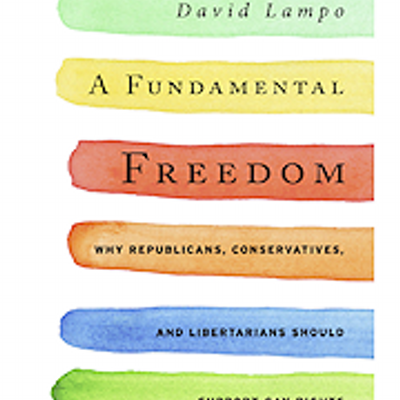David Lampo published his book “A Fundamental Freedom” attempting to persuade members of the Republican party to be more progressive and become advocates of the gay rights’ movement without sacrificing their commitment to economic conservatism. As he puts it, “This, then will be the challenge for all Republicans, including libertarians and traditional conservatives…: to break the grip on the Republican Party of those with a narrow religious agenda as opposed to those who believe in the ideals of liberty, limited government, and personal freedom for all.” (p. 128)
Lampo thinks right wing conservatives need to keep their religious beliefs to themselves but hold fast to conservative economic policies. As Terry Pratchett once put it, people can wait for salvation but prefer dinner to turn up within an hour.
As the subtitle indicates, he wants Americans of all stripes to support gay rights. And of course, all Americans should agree with this, so far as it goes. Before anyone falls into a paroxysm of evangelical hyperventilation, let me explain. I and every other American and Christian should support a gay person’s right to free speech, right to bear arms, right to a fair trial, etc. I even agree that homosexuals can marry, provided they marry someone of the opposite sex. Do gay people have the right to defend themselves if they are harassed on the street, or the right not to self-incriminate if harassed by law enforcement? Absolutely. But of course this is not what the gay rights activists are after.
Conservative economic policies I can agree with. I believe that is what the Bible actually teaches. But the same Bible also teaches me how to think about sexuality. That is the standard for all ethics that I adhere to. And this is where Lampo’s argument breaks down. He makes very clear what his standard for sexual ethics is. “Laws that prohibited voluntary sexual relations between consenting adults were declared unconstitutional by the Supreme Court in the 2003 Lawrence v. Texas case.” (p. 39) But just where are the brakes on this thing? Any consenting adults? Is incest is ok? What about bestiality? Lampo is silent on this. He either is perfectly ok with such activity and will not openly say so, or condemns those behaviors but never explains why. He also castigates evangelicals’ hypocrisy on such issues, citing Gingrich’s enthusiastic support of traditional marriage by having as many as possible. Yes, hypocrisy is bad. But what if all the hypocrites involved are consenting adults? By what standard does he condemn such behavior?
He frequently rants against “imposing morality” or conservatives not keeping their religious beliefs out of politics, but this is disingenuous. All law is imposed morality. The question is what standard of morality should we impose. Christians believe that Jesus has all authority in heaven and on earth, and we want to see all areas of life, including law, subjected to him. When Lampo complains that Christians who want a theocracy (he makes it sound like that’s a bad thing) he is simply asking us to not to believe that Jesus is Lord of everything. The alternative to having Christians impose their morality on gay people is to have gay people impose their morality on us. There is no third option.
But if Christians imposed Biblical law on society, we would not have fastidious legalisms enforced by law. The Bible is clear on the difference between sins and crimes, i. e, the Bible teaches the functional separation of church and state, while also teaching that both are to be obedient to him. All crimes are sins, but not all sins are crimes. If we did have a theocracy, the civil government’s authority would remain quite limited. Murder, rape, theft, and acts of homosexual sex would all be illegal, but smoking, drinking, dancing, and having terrible taste in clothing would all be perfectly legal.
You can get your own copy of Lampo’s book here.

Five questions I would like to ask David Lampo:
- You’re asking American of all different stripes to support gay rights to marriage and other legal equalities. Would you advocate the same for people who would like to engage in incest, or polyamory? Do you condemn the man who said he was in a homosexual relationship with his brother in a letter addressed to Dear Prudence on February 16, 2012 in Slate? If you condemn these acts or think they should be illegal, by what standard do you do so? (see p. 40-1) Isn’t Rick Santorum’s reductio on p. 142 correct?
- Christians want to impose morality on others, but gay rights advocates are seeking to do the same. It’s not a question of whether, but which. How do we adjudicate which morality we impose? Who gets to decide what’s criminal and what’s not?
- From a Christian perspective, I agree hypocrisy is bad. But from your perspective what if all the hypocrites involved are consenting adults? Why condemn a serial adulterer? On what basis?
- Should criticism or homosexuality be illegal? Should all anti gay speech be banned? What about the 1st Amendment then? Should Christians be allowed to refuse to bake cakes for a gay wedding?
- You say on p. 65 that people are just using scare tactics to say that ministers will be forced to perform same sex weddings. In your opinion, what would not count as coercion? Being fined? Thrown in prison? If someone were to say, “We won’t force you to do X but if you don’t you’ll go to prison” that person does not really understand coercion.
